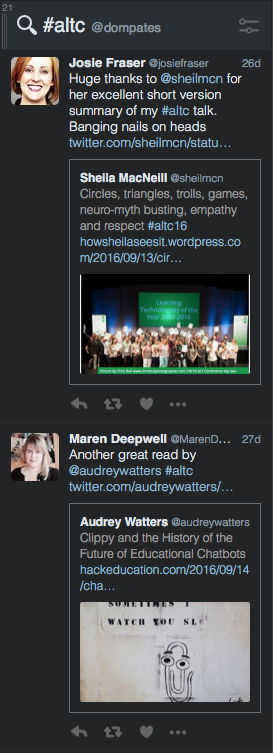
ALT-C (the Association of Learning Technologies Conference) is the UK’s premier gathering of people from across the learning technology spectrum. I attended my first ALT-C in 2014 – a smorgasbord of sectoral experiences and ideas to sample, snack and binge on.
In 2016, I was drawn back into its orbit, but via forms of remote attendance instead, including via Twitter, watching streamed keynotes, and taking part in an online Hangout. Key themes from ALT-C 2016 included lecture capture, open educational practices (OEP) and learning analytics.
Part of going to a conference is the buzz of being there – being surrounded by like-minded people, sharing their explorations into a particular field. While it’s never going to be the same as being in the room, virtual conference participation can give you some of that buzz when projects, budgets, or other commitments mean you just can’t be there in person. This post contains a handful of reflections on virtual conference participation, arguably a form of OEP.
If a conference has a degree of openness to it, as ALT-C does, then you can interact with the community without having to be directly amongst them. That openness factor was crucial to my ability to participate. It came from delegates, sharing the nuggets that they came across (eg via Twitter). It came from the organisers themselves, who shared primary features like keynotes via a YouTube livestream from the main website. It also came from session facilitators, who responded to remote participants by inviting them further in.
As I was at work at the same time as I was ‘at the conference’, attending ALT-C could have had the potential of distracting from whatever else I was doing. I therefore set time aside for joining in on certain bits, such as by putting a couple of keynotes in my calendar, then opted out of joining in at most other times. This helped with finding a balance between ‘being in two places at once’. I then used lunchtimes or moments of waiting around to take a look at the conference Twitter hashtag (#altc). Mobile was a crucial factor here too, allowing me to dip in and out without needing to be sat at my desk.
The two keynotes I watched were top quality – Josie Fraser with ‘Beyond the Valleys of the Trolls’ (above; key takeaway for dealing with trolls: ignore, block, report) and Jane Secker‘s impassioned take (below) on both why copyright matters and the importance of approaching it flexibly.
I didn’t manage to catch any of the individual sessions as this was more ‘remote sampling’ than ‘in the room feasting’, but did manage to pick up a few gems along the way all the same. The notions of both learning styles (link) and digital natives (link) were roundly debunked. Remi Holden introduced the fascinating idea of a ‘failure slam‘, which involved participants sharing stories about experiencing failure and lessons learned. Key principles of multimedia learning were also covered.

One thought on “Reflections on remote conferencing”